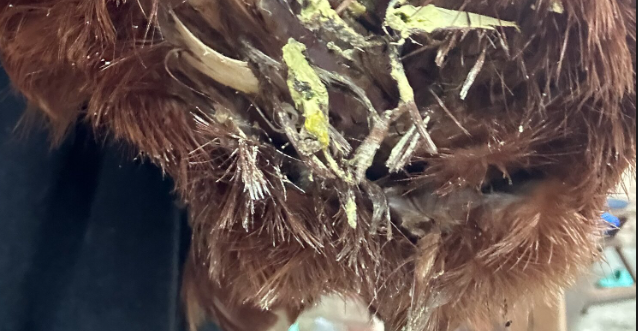
Vent gleet (Cloacitis), often a misunderstood or ignored chicken-raising issue, deserves some attention.
It’s not just a nuisance—vent gleet can be a serious health problem for your hens. Vent gleet is a fungal infection that affects the bird’s vent, the area where eggs and waste exit the body.
Caused by an imbalance in the natural flora of a hen’s digestive system, vent gleet can lead to discomfort and other health issues.
So, what makes a hen prone to vent gleet? Changes in diet, stress, or even other underlying health conditions can trigger it. If your hens suddenly act off or seem less vibrant, it’s worth checking for the telltale signs of vent gleet.
Recognizing this condition isn’t just about catching a foul odor—a constant, unusual smell emanating from your flock’s coop could be a red flag.
Look for other symptoms, such as wet and matted feathers near the vent area, a swollen abdomen, or signs that your hens are having trouble comfortably laying eggs.
Knowing these signs can make a big difference in addressing the problem early. Now, just because your chickens had a good day in the dust bath and their bottoms are dirty doesn’t mean they have vent gleet.
Gleet starts small enough but eventually can become quite nasty. There is an obvious difference between dirty and nasty.
Diagnosing is a professional job, but seeing these signs should prompt a quick call to your vet. They’ll determine if vent gleet is the real culprit. Other Cloaca-related issues are egg-binding, prolapsed vent, and vent picking by other chickens. These have to be ruled out to conclude that Cloacitis is your problem.
It’s all tied to the bird’s overall well-being. When hens are afflicted with this condition, it can trigger a chain reaction, impacting not just the individual bird but the entire flock’s health environment.
Creating an environment where vent gleet doesn’t stand a chance means understanding its causes and symptoms. That’s the first step in keeping your hens healthy, happy, and productive. With this knowledge, you’re better equipped to notice early signs and seek timely help.
Impact of Vent Gleet on Egg Production
Vent gleet can seriously damage your egg basket. Hens are resilient creatures, but when least expected, their egg production can take a nosedive due to this condition.
Does vent gleet really mess with egg production? Absolutely, and here’s why. The infection causes discomfort and stress in hens, directly affecting their laying habits. A stressed hen often leads to fewer, if not completely halted, egg outputs.
Watching out for changes in egg production can be your first clue. If you notice your hens laying less or if the eggs don’t have the usual quality—smaller size or poor shell integrity—it’s time to investigate.
So, how can you tell if vent gleet is the cause? Keep an eye on any correlation between the onset of symptoms and changes in egg stats. Hens suffering from vent gleet might show signs like strained laying or even odd behavior around the nesting boxes.
The scientific angle? Vent gleet disrupts the hen’s reproductive system due to the stress it imposes, reducing hormone production necessary for egg development. Simply put, less comfort means fewer eggs.
Let’s not forget each hen responds differently. Some might slightly decrease egg count, while others might stop laying altogether. Paying attention to each hen’s patterns will give a more accurate picture of what’s happening.
Recognizing and Addressing Vent Gleet Promptly

Spotting the early signs of vent gleet can be your best defense against a full-blown infection. Knowing exactly what to look for ensures you can act before things get serious.
Observe your hens for any telltale symptoms, like wet, matted feathers around the vent area we talked about earlier, and unusual behavior, like frequent pecking at their rear.
When you suspect vent gleet might affect your hens’ egg production, it’s time for a quick assessment. A daily egg count and quality log can help identify patterns or sudden changes. This information can also be handy when consulting your vet for advice.
Addressing vent gleet requires a mix of remedies at home and from the vet’s office. Home remedies might include dietary changes like adding probiotics or apple cider vinegar to their water, which can help restore a healthy gut flora balance. But never skip consulting a vet—they might prescribe antifungal treatments specific to your hens’ needs.
A word about antifungals: Fungi resemble chickens more closely than viruses or bacteria, so antifungals can be harder on them than other treatments, especially if the animal is weakened by disease.
The point is that it’s better to catch vent gleet sooner than later.
Prevention is the name of the game. Good coop hygiene and a stress-free environment for your hens go a long way in minimizing the risk of vent gleet. Regular cleaning, proper ventilation, and a balanced diet are crucial steps to help keep your flock healthy.
Remember, acting early helps shield against egg production woes and keeps your hens happy and thriving overall. The more you know, the better you can guard your feathered friends against issues like vent gleet, leading to a steady supply of fresh, quality eggs.
Long-Term Solutions for Healthy Egg Production
Getting things back on track after treating vent gleet requires consistency and care. Once your hens start recovering, monitoring their egg production and overall health is vital to ensure everything’s moving in the right direction.
Regular health checks and monitoring their laying patterns can help prevent future recurrences of vent gleet or other issues. It’s better to be proactive rather than reactive.
A health plan tailored specifically for your flock can be a game-changer. This might include dietary supplements, regular deworming schedules, and maintaining a peaceful environment, all designed to keep your hens in peak condition.
Good nutrition plays a huge role in preventing health issues. A balanced diet rich in essential nutrients helps your hens stay strong and less susceptible to infections like vent gleet. That means ensuring they can access clean water, quality feed, and maybe even a few healthy treats they love.
Do you have any experience with Vent Gleet? Please tell us in the comments below. You’d be surprised at how many people you can help with your shared experiences, especially photos.
Dave

Chickenmethod.com
